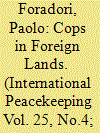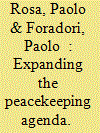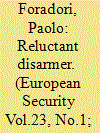|
|
|
Sort Order |
|
|
|
Items / Page
|
|
|
|
|
|
|
| Srl | Item |
| 1 |
ID:
160934


|
|
|
|
|
| Summary/Abstract |
This article analyses the role of Italy in international policing, focusing on the reasons, specific features, multifaceted character and value of its contribution. The argument is made that participation in such operations has become a distinctive character of Italy’s international projection and ideally suits its security culture and foreign policy objectives. Italy’s role is positively appraised because it responds to the international community’s demands for a more robust, specialized and highly trained police force that is needed to meet the complex challenges of the contemporary global security environment.
|
|
|
|
|
|
|
|
|
|
|
|
|
|
|
|
| 2 |
ID:
154339


|
|
|
|
|
| Summary/Abstract |
This article aims to explain the emergence and assess the politico-military significance of ‘cultural peacekeeping’ (CPK) as a new task for international peace operations. The aim is to provide a conceptual appraisal of CPK and an initial insight into its objectives, opportunities and challenges. The analysis supports the inclusion of a cultural component in the mandates of peacekeeping interventions, even if we must be wary of the inherent difficulties and risk of unintended consequences. These are not to be underestimated, at the risk not only of failing to achieve the mission’s objectives but also of further deteriorating security on the ground and beyond. It follows that CPK should not be mistaken, nor presented to the public, as a minor, light, and inexpensive operation. Quite to the contrary, it is an extremely complex and politically very sensitive politico-military major exercise that needs careful planning and adequate capabilities. Misunderstanding or mismanaging CPK can severely backfire. It is a ‘double-edged weapon’ that must be handled cautiously to avoid the risk of the enemy manipulating it to its own advantage.
|
|
|
|
|
|
|
|
|
|
|
|
|
|
|
|
| 3 |
ID:
135281


|
|
|
|
|
| Summary/Abstract |
The global nuclear regime may have reached a crossroads: the states parties to the Nuclear Non-Proliferation Treaty have called for the establishment of a zone free of nuclear weapons and other weapons of mass destruction and their delivery systems in the Middle East. Now that Iran and the five permanent members of the UN Security Council plus Germany have reached a deal in Geneva over a phased verification of the peaceful character of Iran's nuclear program, the international community needs to address broader regional issues. Failure to move forward could imperil the global nonproliferation architecture. At the same time, little thought has been given to how this regional arrangement would work both internally (with its member states) and externally (with other organizations such as the International Atomic Energy Agency). This article reviews the obstacles and windows of opportunity for a comprehensive regional nuclear settlement by drawing lessons from recent history in Europe. In particular, the history of the European Atomic Energy Community suggests how a future regional organization with jurisdiction in all aspects of nuclear development should articulate its functions with existing international organizations such as the IAEA. In Europe, regional institutions have played a crucial role in creating trust among former warring nations and in harmonizing the regional and global nuclear orders. A EURATOM-like organization would be a great step for the Middle East and a great model for other regions that must deal with issues of global legal complexity (e.g., how they can harmonize regional and global orders so that they can pursue the same goals with different but compatible means).
|
|
|
|
|
|
|
|
|
|
|
|
|
|
|
|
| 4 |
ID:
134658


|
|
|
|
|
| Summary/Abstract |
Regrettably, moral arguments are largely absent from the current debate on nuclear disarmament. Indeed, complementing politico-strategic thinking with ethical categories could significantly strengthen the abolitionist call. To fill the gap, this article analyzes the evolution of the nuclear ethics of the Roman Catholic Church and especially its position on nuclear deterrence. If this strategy was granted interim and strictly conditioned moral acceptance during the Cold War, nuclear deterrence is today increasingly considered ineffective, an obstacle to genuine disarmament, and hence morally unjustifiable. In the new security context, the conditions for the Catholic Church's “interim nuclear ethics” have altered, and nuclear disarmament has become a feasible option and an alternative strategy to deterrence.
|
|
|
|
|
|
|
|
|
|
|
|
|
|
|
|
| 5 |
ID:
127825


|
|
|
|
|
| Publication |
2014.
|
| Summary/Abstract |
Of the five North Atlantic Treaty Organization (NATO) European countries of US nuclear forward deployment, Italy is the least-known and studied case, even though the country hosts the largest number of US nonstrategic nuclear weapons (NSNWs) and still has two bases of deployment. The paper aims at filling this gap by analyzing Italy's current view on the presence, value, and future of NSNWs hosted on its territory. The analysis begins with the examination of the process of profound devaluation that has minimized, starting from the end of the cold war, Italy's original interest in this category of weapons. It then examines the reasons why Rome continues to pursue conservative nuclear weapon policies and distances itself significantly from the progressive camp of NATO members, particularly Germany, that explicitly call for the withdrawal of US NSNWs from Europe. Through the study of the Italian domestic politics and security culture, the article explains Italy's opposition to any radical change in the NATO nuclear status quo, and its reluctance to pursue policies that are consistent with the process of nuclear devaluation that the country has experienced over the past two decades.
|
|
|
|
|
|
|
|
|
|
|
|
|
|
|
|
| 6 |
ID:
160902


|
|
|
|
|
| Summary/Abstract |
In the context of the increasing securitisation of cultural heritage, France, Italy, and the United Kingdom have reacted differently to the recent wave of iconoclasm perpetrated by the Islamic State of Iraq and Syria (ISIS) and similar radical groups and terrorist organisations. With cultural heritage now discursively identified as a security concern, the three states enacted security practices to deal with the newly emerged security threats. All three cases show a tight association between the protection of cultural heritage, development and security policies. State-driven cultural heritage protection policies continue to be designed around the notion of multilateral cooperation, although innovative forms of public-private multilateralism and civil-military cooperation are increasingly being introduced.
|
|
|
|
|
|
|
|
|
|
|
|
|
|
|
|
| 7 |
ID:
111125


|
|
|
|
|
| Publication |
2012.
|
| Summary/Abstract |
Despite the fact that Italy hosts almost half of the remaining estimated 150-200 US tactical nuclear weapons (TNW) that are currently deployed in Europe, case studies of Italy have been largely neglected. The article seeks to fill that gap by outlining the key elements of Italy's position regarding the presence, role, and future of TNW in Italy. By considering both the military and political-symbolic dimensions of TNW, the author argues that Italy has largely embraced the process of the devaluation of nuclear weapons; however, this is offset by the country's determination to preserve the principles of solidarity and the indivisibility of Euro-Atlantic security. By making the alliance's cohesion a priority, Italy appears willing to postpone the complete elimination of TNW from its territory if necessary; despite this, Italy otherwise considers TNW to be not only weapons of little intrinsic value but also obstacles to the global nuclear disarmament program that it strongly supports.
|
|
|
|
|
|
|
|
|
|
|
|
|
|
|
|
|
|
|
|
|